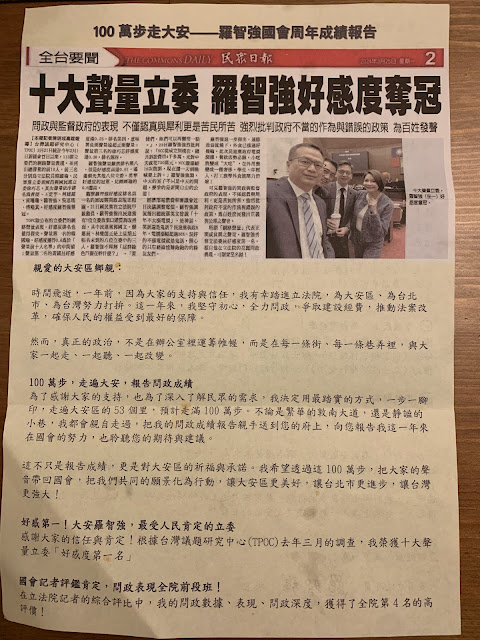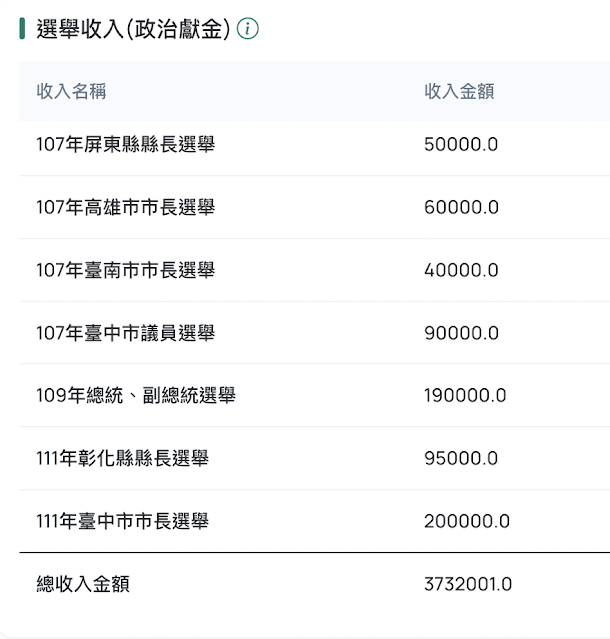I don't have a better title, either. I don't keep a blog because I'm trying to be the news; I'm usually not even trying to be objective. Taiwan is my forever home, or at least I intend for it to be; I have a personal stake in what happens here.
The recall result is gutting. Not from an analyst's perspective, per se, but from the perspective of a person who calls Taiwan home -- a person who has grown more pro-independence the longer she lives here, and the more history she reads.
Nobody thought all 24 legislators would be recalled today, but most of us expected it to be anywhere between 4 and 8. Given the hype, the high number of petition signatures, the number of politicians up for recall who'd barely won their seats, and the general distaste for the KMT's recent pro-China actions, this seemed reasonable.
I personally had been hoping it would be Hsu Chia-hsin (徐巧芯), Lo Chi-chiang (羅智強), Fu Kun-chi (傅崐萁) and Wang Hong-wei (王鴻薇). Not for any strategic reason: there were probably better choices to want recalled than these, who might have flipped a district. I just hate these four on a gut level.
I didn't want to admit it to myself, but in the weeks leading up to the recall, I'd heard more and more people saying they thought it was too much, or that the DPP had been in power for too long (overriding their previous common-sense that the KMT is dangerously in bed with China). I knew that there were many voters who might not love the KMT, but dislike recalls being used in this way even more.
It's a fair argument for anyone but the KMT to make -- arguably this isn't the best use of the recall mechanism. It just rankled to hear the KMT make it, seeing as they tried scveral times to use the same mechanism against the DPP.
I'd hoped that perhaps voters would see beyond this, and understand that at least some of the legislators up for recall deserved to lose office. Hsu, Lo, Fu and Wang, specifically. As a friend noted, the problem here is that not everyone follows politics that closely; we know why they should go, but there are people who genuinely don't remember that Fu, for example, is a criminal, and Wang is a hypocrite.
I'd hoped they'd realize that the KMT's screaming about the DPP being "dictators" and "not democratic" was absolute nonsense, seeing as they were screaming it from the prime rally spot on Ketagalan Boulevard the night before the vote. Dictators don't let the opposition have the best rally position, or any rally at all. I'd hoped they'd realize that this showed the KMT's fundamental unseriousness.
I was wrong to hope for this.
I'd hoped that they wouldn't believe the KMT line that the recalls were a DPP-initiated attack. Again, I was wrong to hope for this. The DPP certainly supported it, but they didn't instigate it. A lot of people don't seem to realize this, however -- the KMT framing of the recall worked. Whether or not one agrees that the legislators in question should have been recalled (some should have, others less so), that's a shame. It simply wasn't true.
Unless the KMT does something to massively screw up in the next few years, today's result may well look bad for the DPP in the next election, even though the DPP weren't the main organizers of the recall initiative. If the KMT is smart, they'll let the voices who don't sound insane take the lead (think: Lu Shiow-yen -- I'd almost certainly hate her as president, but she doesn't sound like a nutter). They already had a good chance to win in 2028. If they do this, they'll have an even better chance.
In the meantime, the KMT-led legislature has three years to continue undermining Taiwan. Today's win might have given them enough confidence to speed it up. If they win in 2028, there is no obvious way to stop their priming Taiwan for annexation by their good buddies in the CCP.
With voters seeming a bit sick of having the DPP in power, but no good alternatives that aren't the KMT or their TPP accomplices, there's no obvious way to stand up to the KMT that doesn't necessarily keep the DPP in power. Smaller parties such as the New Power Party, Social Democrats, Green Party and Statebuilding Party have tried and mostly failed to provide non-KMT alternatives to holding the DPP accountable. Many (though not all) of their stars have been recruited into the DPP; great for the party, but not great for building non-KMT choices.
And can I really hang my hopes on a future-maybe-someday President Miao Poya (苗博雅)? She deserves it and is smart enough for the job, but probably not.
There aren't very many bright sides, although I am trying to look for them. Unlike the president of the United States, the president of Taiwan isn't a pedophile? I guess that's an upside.
Can we do better? It's a very good thing that the DPP didn't get to optically involved in the recall campaign. Trying to convince the electorate, already a bit tired of the DPP, would have been idiotic strategically. The DPP were smart enough to realize that. Good.
They likely wouldn't have gotten more voters out to support the recall than the activists, who did a great job. At least in my district, you could feel the ire: those recall campaigners were everywhere, even parts of town that didn't really welcome them. I was seeing pro-recall banners in public housing (國宅) typically occupied by the 1949 diaspora and their descendants. The DPP wouldn't have made much headway -- they can barely show their faces there! The KMT regularly holds rallies in public housing courtyards in Da'an; the DPP never, ever does.
Anyone who truly believed in it would have voted anyway; anyone who didn't wouldn't have. I doubt it would have changed the outcome much; if it had, it would have harmed it. But if they'd been the main instigators or been more obviously involved, it would have been humiliating for them. They'd be on TV bowing and apologizing, rather than making statements that this isn't a defeat or a battle between political parties.
In Da'an, at least, there is a substrate of voters who won't necessarily vote for the KMT -- they regularly elect Miao to the city council and she regularly takes second place -- but would never, ever vote for something promoted by the DPP. There are also KMT voters in Da'an so blue that they're angry about how 'red' Lo Chi-chiang has become. The activists ultimately didn't persuade enough of them, but the DPP wouldn't have stood a chance.
I'm speaking only of Da'an here, but the same points are likely salient for other districts. The crowd at the rally last night was energized by the fact that this wasn't a DPP-led campaign (it was merely a DPP-supported one). They were singing the anthem of the Sunflowers, not any of the more DPP-coded songs.
Perhaps I hoped a little too hard that Lo would be ousted because outside the public housing complexes, the area doesn't feel particularly blue. It's important to remember that a lot of the university students who make Da'an interesting aren't registered to vote here. It doesn't matter at all that they're usually not KMT voters.
Another bright spot is that there isn't likely to be another mass recall movement anytime soon. That's not only good because the law isn't well-balanced for what it's meant to achieve, but also because it's so tiring. Voters clearly don't like it, and I wouldn't be surprised if the law was changed yet again (there were changes passed earlier this year). We've now learned it doesn't work in this way, regardless of which party is being targeted, and regardless of who instigates it.
It doesn't work this way because voters don't want it to work this way. Despite the fact that I desperately wanted the worst KMT legislators kicked out, I suppose that's a win for democracy. Next time someone tells you the DPP is "undemocratic" or "a dictatorship", please remind them of this.
I know that sounds contradictory: I wanted it to work this time because I specifically dislike many of the people up for recall, but think it's a positive that we're probably done with new recall campaigns for the foreseeable future. Yeah, that's right, I do hold two somewhat-opposing viewpoints in my head at the same time.
A final bright spot: the KMT probably feels victorious tonight. Sure, okay, they've "earned" it, I guess. Don't forget, however, that tonight only happened because the KMT's own recall initiative against the DPP -- a party-led intiative, unlike this one -- failed miserably. They were the ones who should have been embarrassed, back when it came out that they were putting their own dead moms on the petition. The KMT is unable to feel shame, so they didn't act embarrassed by this, but they should have.
I don't have much else. This isn't good, and no amount of whiskey, Indian food or looking for brights pots will make it good.
But it's over, and there are not-terrible things we can say about it.
There are more recalls coming up in August, but honestly, if Taiwan wasn't willing to oust a convicted frauster, I'm not sure they're going to oust a credibly-accused traitor.
It would be a bad decision to let someone like Ma Wen-chun stay in office, but then it was a bad decision to let a criminal like Fu Kun-chi stay in office. It was a bad idea to elect either of them in the first place.
But what do I know? I can't vote. I just live here.

































